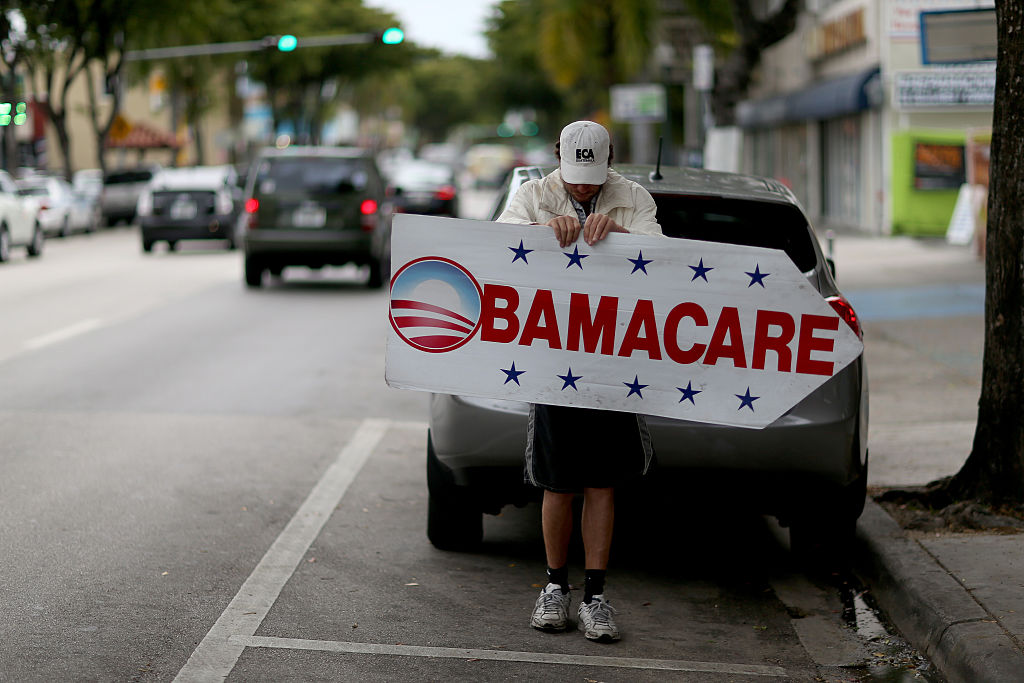Insurance giant Aetna is pulling out of most ObamaCare exchanges


A free daily email with the biggest news stories of the day – and the best features from TheWeek.com
You are now subscribed
Your newsletter sign-up was successful
On Monday, large health insurer Aetna said that it is withdrawing from the ObamaCare exchange markets in two-thirds of the 778 counties where it was participating, keeping all its exchange offerings in just four states: Delaware, Virginia, Nebraska, and Iowa. Aetna CEO Mark Bertolini said that "as a strong supporter of public exchanges as a means to meet the needs of the uninsured, we regret having to make this decision," but that its 838,000 exchange customers were sicker than anticipated, driving up costs and making the exchanges unprofitable. Other large insurers, including United Health and Humana, have also said they will scale back their involvement in the exchanges in 2017.
"It seems increasingly clear that big, national insurers are having trouble competing in the ObamaCare marketplaces and making money," said Larry Levitt at the Kaiser Family Foundation. "Some insurers are still doing well, particularly those that historically served Medicaid beneficiaries." Aetna said Monday that it has lost $430 million in its individual policy unit since January 2014, when the ObamaCare exchanges opened. Some 11 million Americans have insurance through the exchange marketplaces, and they are the only place where consumers can get federal subsidies, making them a key component of the Affordable Care Act.
Some allies of President Obama tied Aetna's withdrawal to the Justice Department's decision last month to block the company's planned merger with Humana, plus Anthem's acquisition of Cigna. As late as May, Aetna said it planned to expand its ObamaCare exchange options, Sen. Elizabeth Warren (D-Mass.) said on Facebook last week, after Aetna announced it was considering this withdrawal. "Aetna may not like the Justice Department's decision to challenge its merger, and it has every right to fight that decision in court," she said, but "the health of the American people should not be used as bargaining chips to force the government to bend to one giant company's will."
The Week
Escape your echo chamber. Get the facts behind the news, plus analysis from multiple perspectives.

Sign up for The Week's Free Newsletters
From our morning news briefing to a weekly Good News Newsletter, get the best of The Week delivered directly to your inbox.
From our morning news briefing to a weekly Good News Newsletter, get the best of The Week delivered directly to your inbox.
Several large insurers have complained about the program's risk-adjustment apparatus. "I think the market will stabilize, and perhaps Aetna and United will come back," Washington and Lee University law professor emeritus Timothy Jost tells CNNMoney. "But the market really needs support for another few years until it does, and since the majority in Congress is rooting for [the Affordable Care Act] to fail, it seems unlikely that the support will be forthcoming."
A free daily email with the biggest news stories of the day – and the best features from TheWeek.com
Peter has worked as a news and culture writer and editor at The Week since the site's launch in 2008. He covers politics, world affairs, religion and cultural currents. His journalism career began as a copy editor at a financial newswire and has included editorial positions at The New York Times Magazine, Facts on File, and Oregon State University.
-
 James Van Der Beek obituary: fresh-faced Dawson’s Creek star
James Van Der Beek obituary: fresh-faced Dawson’s Creek starIn The Spotlight Van Der Beek fronted one of the most successful teen dramas of the 90s – but his Dawson fame proved a double-edged sword
-
 Is Andrew’s arrest the end for the monarchy?
Is Andrew’s arrest the end for the monarchy?Today's Big Question The King has distanced the Royal Family from his disgraced brother but a ‘fit of revolutionary disgust’ could still wipe them out
-
 Quiz of The Week: 14 – 20 February
Quiz of The Week: 14 – 20 FebruaryQuiz Have you been paying attention to The Week’s news?
-
 TikTok secures deal to remain in US
TikTok secures deal to remain in USSpeed Read ByteDance will form a US version of the popular video-sharing platform
-
 Unemployment rate ticks up amid fall job losses
Unemployment rate ticks up amid fall job lossesSpeed Read Data released by the Commerce Department indicates ‘one of the weakest American labor markets in years’
-
 US mints final penny after 232-year run
US mints final penny after 232-year runSpeed Read Production of the one-cent coin has ended
-
 Warner Bros. explores sale amid Paramount bids
Warner Bros. explores sale amid Paramount bidsSpeed Read The media giant, home to HBO and DC Studios, has received interest from multiple buying parties
-
 Gold tops $4K per ounce, signaling financial unease
Gold tops $4K per ounce, signaling financial uneaseSpeed Read Investors are worried about President Donald Trump’s trade war
-
 Electronic Arts to go private in record $55B deal
Electronic Arts to go private in record $55B dealspeed read The video game giant is behind ‘The Sims’ and ‘Madden NFL’
-
 New York court tosses Trump's $500M fraud fine
New York court tosses Trump's $500M fraud fineSpeed Read A divided appeals court threw out a hefty penalty against President Trump for fraudulently inflating his wealth
-
 Trump said to seek government stake in Intel
Trump said to seek government stake in IntelSpeed Read The president and Intel CEO Lip-Bu Tan reportedly discussed the proposal at a recent meeting
